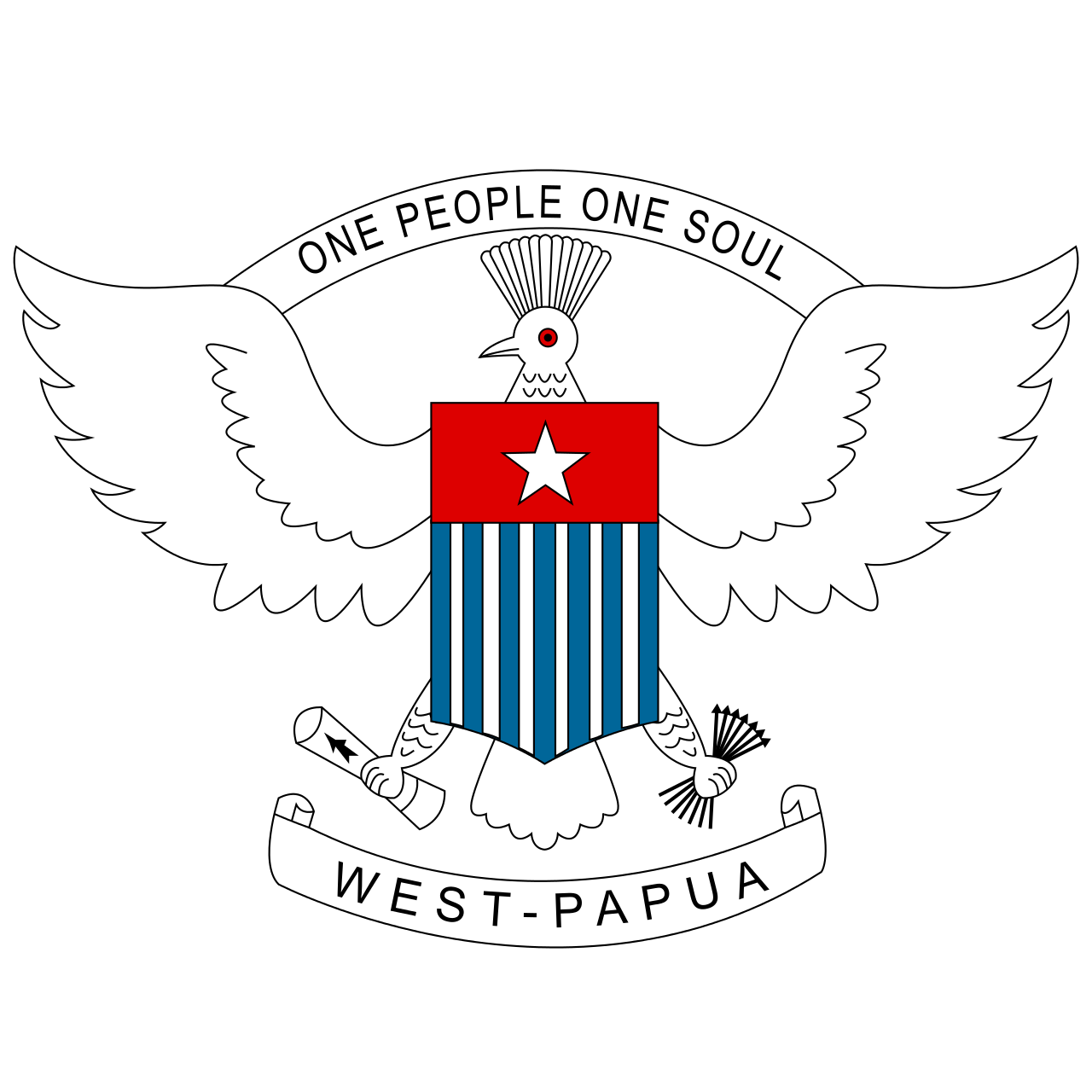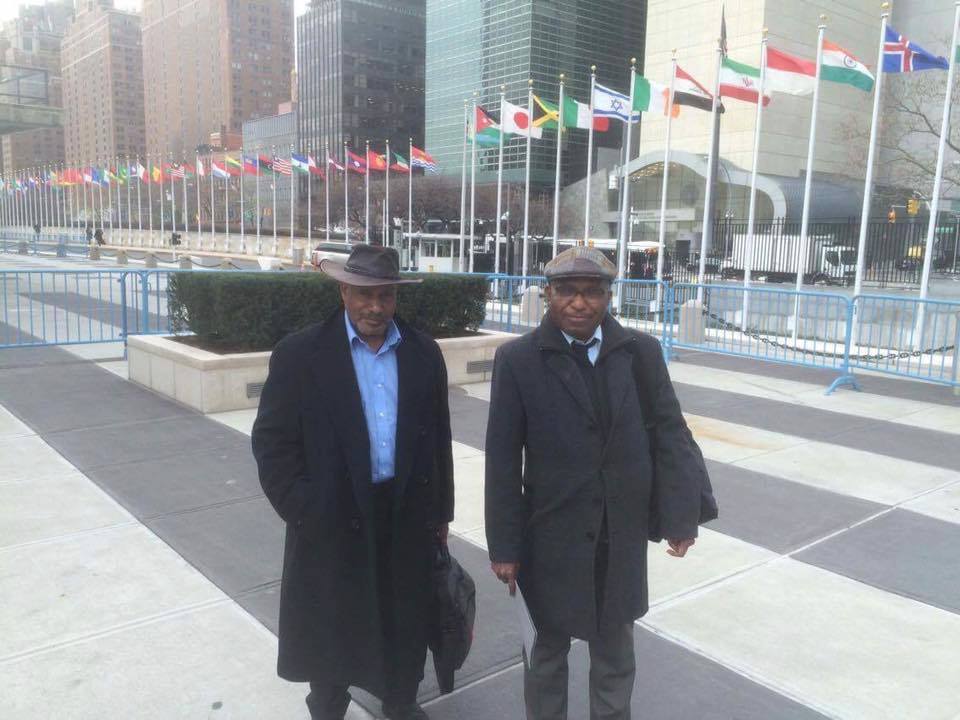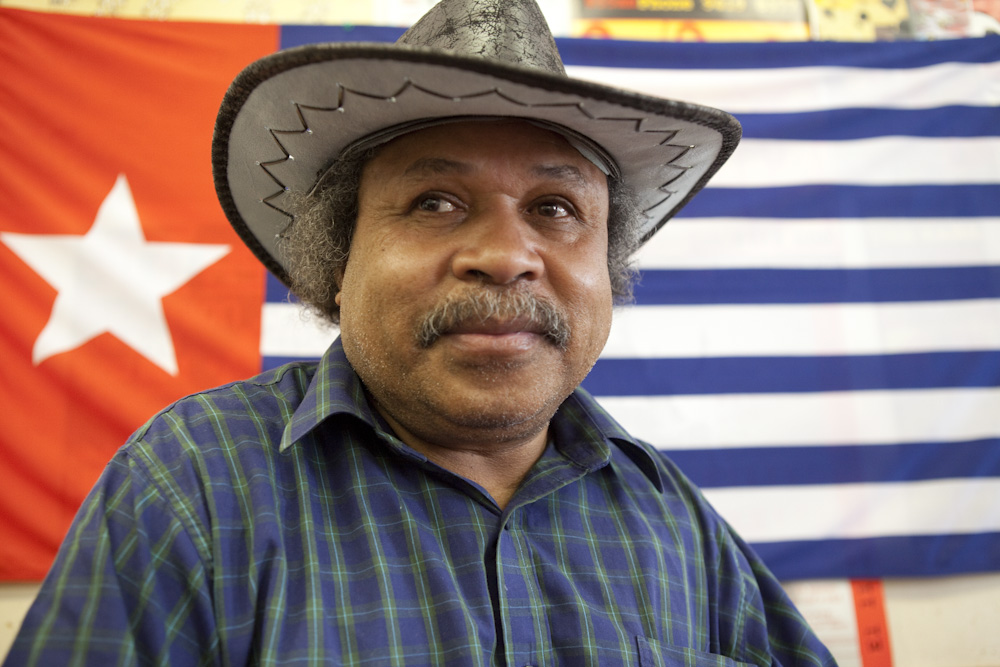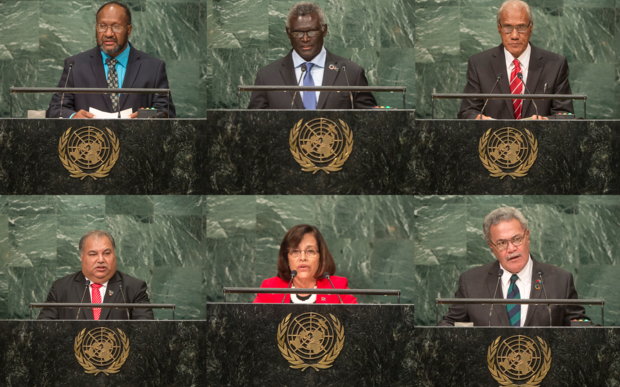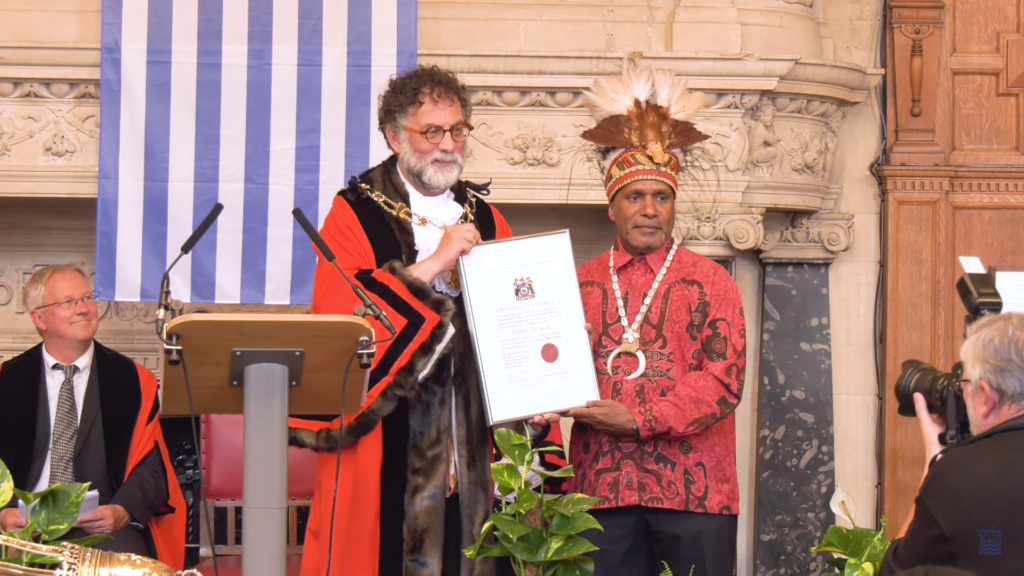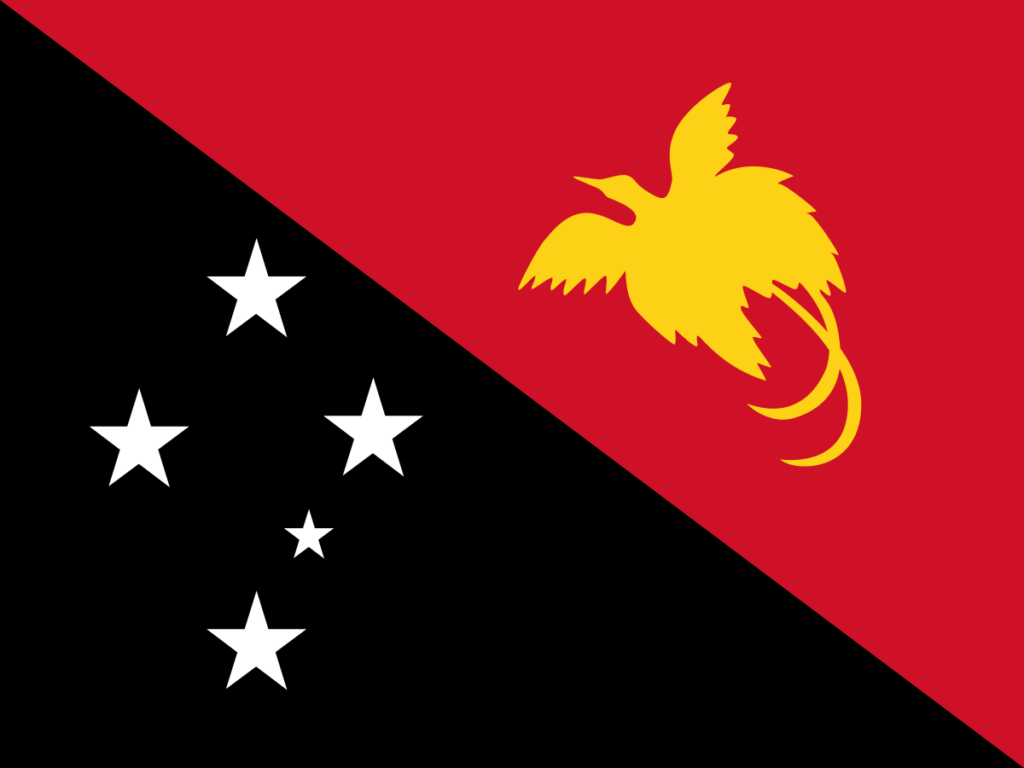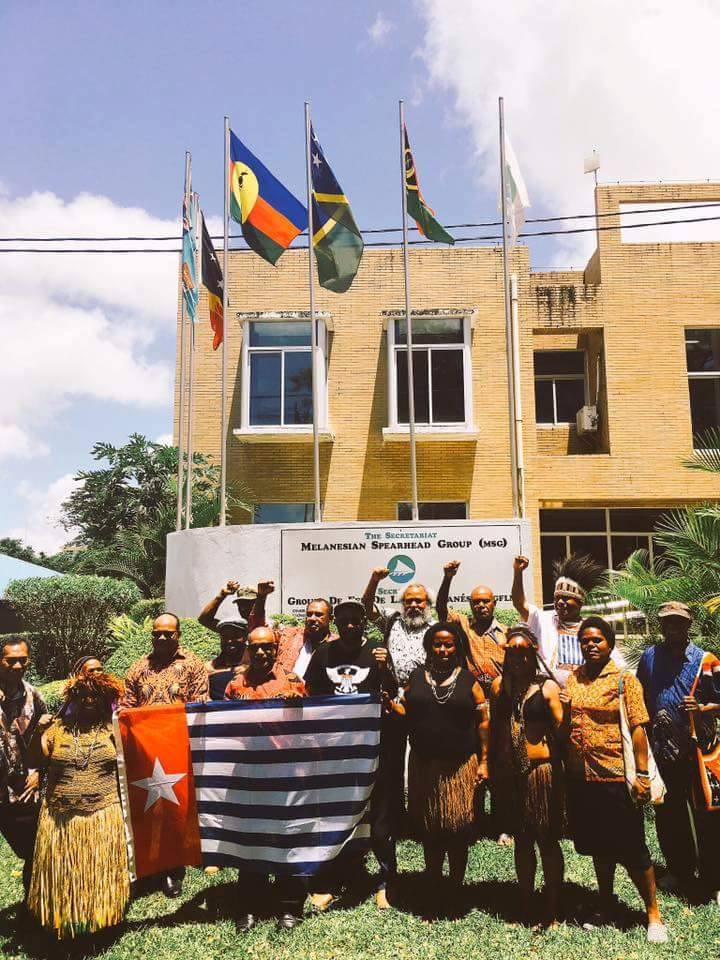 Final delivery:
Final delivery:
Hon. Milne Tozaka, Minister of Foreign Affairs of the Solomon Islands;
Hon. Rimbink Pato, Minister of Foreign Affairs of PNG;
Hon. Bruno Lengkon, Minister of Foreign Affairs of the Republic of Vanuatu
Hon. Ratu Inoke Kubuabola, Minister of Defense of the Republic of Fiji
Mr. Mikael Forrest, Secretary for Foreign Affairs of the FLNKS
Representatives of the Republic of Indonesia;
Director General of the MSG and your staff;
Ladies and Gentlemen;
Thank you for your time and your concern on this issue. Without the encouragement that your countries have provided, we would of course still be dreaming and we would of course still be struggling, but with far less hope.
Mr. Chairman, like yourself and many of you around this table, you have also taken up our cause, following in the footsteps of the great Walter Lini, father of Vanuatu and of an independent Melanesia. Like them, you have raised anew the banner of Melanesian solidarity and of West Papuan self-determination. As foreign ministers, as leaders in your own right, the international issue of West Papua is clearly in your purview.
Mr. Chairman, West Papua is hardly a ‘new’ issue. It is among the oldest of the internationalized issues of Melanesia. It was there at Day 1, at the dawn of the post-World War 2 era. West Papuans have again and again expressed their dreams and desire and their right to stand as an independent nation among the nearly 200 nations of the Earth.
Mr, Chairman, had it not been for a few twists and turns of history, you can I can agree that I would have been sitting where you are, and one or some of you sitting where I now find myself.
TIME CONCERN
Even before Indonesia arrived, in 1961, the First Congress of West Papua declared our freedom, our right to be free. They flew the independence Morning Star flag and sang the new national anthem of West Papua, “O, Papua my country. Then again, in 1971, the Organization of Papuan Freedom, the OPM, declared West Papua as independent, if not in reality, at least in intent. When Suharto fell from power in 1998, and we enjoyed the first moment of freedom since Indonesia robbed us of our birthright, a Second Congress of the Papuan People, in 2000, again expressed the will and desire of West Papua.
That second Congress stated its rejections of all that had happened after that first Congress of their fathers, including the 1962 New York Agreement between Indonesia and the Netherlands and its subsequent implementation in the shamefully named Act of Free Choice of 1969.
Mr. Chairman, West Papua was handed from one colonial regime: from the Dutch, to Indonesia. Consequently, the Dutch have enjoyed trade benefits with Indonesia up to the present and Indonesia has benefitted from the Americans by handing over the vast gold and copper mountain of Nemangkawi, to the U.S. corporation, Freeport Mc MoRan.
Indonesia, of course, claims that its rule in West Papua is not any kind of colonialism, that West Papuans have no need for any presence in this or any other international body except as citizens of Indonesia.
Mr. Chairman, if Indonesia believes they have not ‘colonised’ West Papua, then why bar the journalists? Why keep the international NGOs out? Why forbid the fact-finding missions? What does Indonesia fear the world will learn if it is allowed to peer inside, to look around? The BIBLE and the KORAN both tell us that the righteous have nothing to hide.
TIME
Mr. Chairman, MSG together with the Pacific Islands Forum have recognized that West Papua is not an internal issue of Indonesia, anymore than Algeria was an internal issue of France, or that India was of England. And so Indonesia’s sovereignty is not wrongfully infringed by the world’s insistence on scrutinising both the history and current reality of West Papua.
The MSG has recognized that West Papuans are Melanesians and not Indonesians, and as such are endowed with the inalienable right to be accepted as members of this Great House of Melanesia, the MSG.
Mr. Chairman, and through you to the members of this august body, I only ask of you to:
- Please keep up the pressure; please continue to stand with your prime ministers in denouncing human rights violations in West Papua.
- Please work with your fellow foreign ministers to keep our cause on the agenda of the world’s nations.
- Please carry the issue of West Papua into the United Nations and other relevant international and regional fora that you, as foreign ministers, you leaders of your countries, have the privilege of being members of.
Let us therefore remain true to the vision and mission of the MSG and let the voice of your Melanesian Sister and Brother be heard by your hearts and your minds.
West Papua’s day is coming.
God Bless you all!
WA WA WA WA…….
—-
Speech at SOM
Excellencies, Ladies and Gentlemen;
Today, I will NOT speak to you of the plight of West Papua. You are well aware that we, your brothers and sisters, your fellow Melanesians, have suffered under a second – and very brutal – colonial regime during these past fifty years.
You know how we were denied the act of self-determination that was guaranteed to us under international law and by international agreement signed between Indonesia, the Netherlands and the United States. The irony, of course, is that West Papua could very well have been the first independent state of Melanesia by at least a decade or even two.
But you know all this.
Today, we are NOT here to give thanks to all of you who have supported our struggle. You know very well that we are forever thankful
Your Excellencies, you know of course that, thanks to you here in the MSG, West Papua has gained the support of the many Pacific island nations beyond Melanesia. The Pacific Islands Forum has embraced us, placed us on its permanent agenda, just as you have. In September, seven pacific Island nations, 2 from outside Melanesia, stood up in the United Nations General Assembly and made clear that the plight of West Papua must be on the world’s agenda.
The South Pacific now stands with us in saying that as long as West Papua is not free, the grave human rights violations will likely continue.
Mr. Chairman, today we have come back to Melanesia, back to the MSG to upgrade our status. We started here, asking to be included in the organization for two reasons: one, because we are a Melanesian people and, two, in order to help us fulfill the same dream that all of you have dreamed: the ability to determine your own future!
You know this truth too: There will be no end to this conflict with Indonesia, and no peace in Melanesia, until West Papuans can sit in an internationally mediated setting and negotiate as equals with Indonesia. In this regard, we look forward to implementing the outcomes of the Lautoka Foreign Ministers Meeting that was endorsed at the last Special Leaders Summit: to have constructive engagements with the Republic of Indonesia. In order for this to happen, we need to ensure that we are on the right platform with the right preconditions for this Constructive Engagement to be successful.
Mr. Chairman and Excellencies, all of West Papua looks hopefully to you today. Despite Indonesian attempts to silence them, West Papuans are demonstrating throughout our land since the MSG last met. They are saying to you: “Listen to our hearts, listen to the beating of our Melanesian hearts. We are your brothers, your sisters, your family. Help us find the freedom that you have found.”
We, together the people of West Papua, look forward to the successful outcomes of this important governance meeting in terms of next year’s budget and programme and the membership criteria. We remain at the disposal of the Secretariat to assist where needed.
God Bless
Wa Wa Wa!
—-
Full speech at SOM 2016
Excellencies, Ladies and Gentlemen;
Today, I will NOT speak to you of the plight of West Papua. You are well aware that we, your brothers and sisters, your fellow Melanesians, have suffered under a second – and very brutal – colonial regime during these past fifty years.
You know how we were denied the act of self-determination that was guaranteed to us under international law and by international agreement signed between Indonesia, the Netherlands and the United States. The irony, of course, is that West Papua could very well have been the first independent state of Melanesia by at least a decade or even two.
You know that despite Indonesia’s post-Suharto promise, despite its glowing talk of development for West Papua and special autonomy for West Papua, and ‘this for West Papua,’ and ‘that for West Papua’ –- you know well that what it has meant for West Papuans is our deeper submersion under a relentless tide of state-sponsored Indonesian migration and of military and giant corporations that day by day, year by year are building the roads and the new regencies that are only accelerating the theft of our land, the carrying away of our mineral and forest wealth, destroying our culture and burying our people.
Just as the small island nations of the Pacific, like Kiribati and the Marshall Islands are struggling against the rising seas, so are we struggling for our very existence against a rising sea of political, cultural, religious and economic in-un-day-tion.
But you know all this.
Today, we are NOT here to give thanks to all of you who have supported our struggle. You know very well that we are forever thankful.
Your Excellencies, you know of course that, thanks to you here in the MSG, West Papua has gained the support of the many Pacific island nations beyond Melanesia. The Pacific Islands Forum has embraced us, placed us on its permanent agenda, just as you have. In September, seven pacific Island nations, 2 from outside Melanesia, stood up in the United Nations General Assembly and made clear that the plight of West Papua must be on the world’s agenda.
The South Pacific now stands with us in saying that as long as West Papua is denied self-determination, the grave human rights abuses will likely continue.
Today we have come back to Melanesia, back to the MSG to upgrade our status. We started here, asking to be included in the organization for two reasons: one, because we are a Melanesian people and, two, in order to help us fulfill the same dream that all of you have dreamed.
You told us that we needed to tidy our room first. With your help, we created the United Liberation Movement for West Papua, bringing together the many organizations inside and outside our land seeking self-determination. Then you welcomed us into this most essential Melanesian regional governing body. You gave us observer status. You gave us hope.
You nurtured us, as a family nurtures, and then we journeyed out into the world. We explored the regions around our Melanesian home. We made new friends, found new ties of brother and sisterhood. We grew wiser.
And now we’ve returned home to you.
Today, we are here to talk about whether West Papua should become a full member of the MSG. Today, we are here to see whether West Papua meets the criteria that this body will set.
Criteria are difficult. There are always complexities and contradictions. There are always problems of where to start and which way to walk.
The MSG’s original mission was to create independent Melanesian nations wherever Melanesian peoples existed. West Papuans are such a people; West Papua will be such a nation. By bringing us into the MSG as you have, you acknowledged this truth.
Should the MSG only allow already existing nations to be fully represented? You have answered that. Of course not. The Kanaky, still under French rule, are here as full members. If one of the MSG’s primary reasons for even existing was to help liberate Melanesia from colonial rule, then it seems self-evident that you must allow West Papuans to sit as full members at this table, to recognize and further what must be one day.
As you know: for us, the ramifications of full membership are enormous. Not only does it allow us to sit at this table, it allows us to sit at other tables. It allows us to gain the full support of other nations of the world.
You know this truth too: There will be no end to this conflict with Indonesia, and no peace in Melanesia, until West Papuans can sit in an internationally mediated setting and negotiate as equals with Indonesia. In this regard, we look forward to implementing the outcomes of the Lautoka Foreign Ministers Meeting that was endorsed at the last Special Leaders Summit: to have constructive engagements with the Republic of Indonesia. In order for this to happen, we need to ensure that we are on the right platform with the right preconditions for this Constructive Engagement to be successful.
Finally, honourable members, the question at the heart of the issue is this: Who decides whether a people is colonized? Who decides if someone is free or still in chains?
Did the Vietnamese have to ask the French? Did the Angolans accept the word of the Portuguese? Did the Indonesians wait for the Dutch?
All of West Papua looks hopefully to you today. Despite Indonesian attempts to silence them, West Papuans have been demonstrating throughout our land since the MSG last met. They are saying to you: “Listen to our hearts, listen to the beating of our Melanesian hearts. We are your brothers, your sisters, your family. Help us find the freedom that you have found.” They are saying: “Remember: There, but for the grace of God, go I !”
As Grand Chief Michael Somare of PNG said earlier this year: Decisions made here in the MSG “will embed values in future generations of Melanesian people, who will regard our solidarity with admiration if we make the right decisions regarding decolonisation and self-determination,” if we “approve the United Liberation Movement for West Papua’s application for full membership to the Melanesian Spearhead Group.”
God Bless
Wa Wa Wa!
